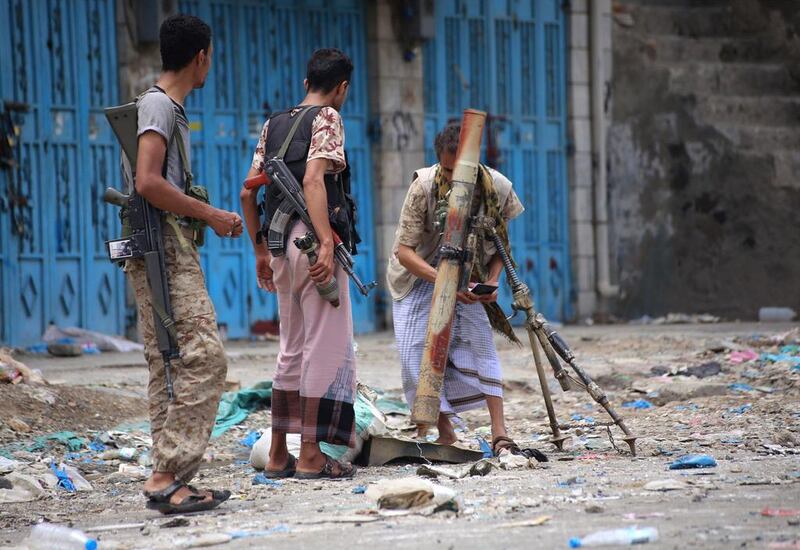ABU DHABI // The 60 Emirati, Bahraini and Saudi Arabian troops killed last Friday in Yemen’s Marib province were the vanguard of an offensive to push back Iranian-backed Houthi rebels and their allies.
Not long ago, GCC soldiers never would have been in such a position. The countries preferred a quiet approach to foreign policy and kept their direct military engagements, such as in Afghanistan, out of the limelight.
All that changed a year ago when most GCC states joined a United States-led coalition against ISIL militants and sent jets to bomb the group in Syria. The UAE announced its participation in the campaign by highlighting the role of Major Mariam Al Mansouri, a female fighter pilot who officials said led the country's initial strikes against ISIL.
Now, in Yemen, a Saudi Arabia-led coalition that includes all GCC states except Oman, is battling the Houthis and their allies, including forces loyal to former president Ali Abdullah Saleh. The US is aiding the coalition with intelligence and aircraft refuelling.
More than 2,100 civilians have been killed in the conflict, according to the United Nations.
The coalition aims to restore the internationally recognised government to power and prevent Iran from gaining a foothold in Yemen, which shares an 1,800km border with Saudi Arabia and a coastline with international energy shipping routes.
Thousands of coalition troops, along with fighters loyal to Yemen's exiled government, pushed the rebels out of the southern port city of Aden in July. The UAE has provided most of the GCC forces for the operation.
Saudi Arabia and Bahrain also have troops on the ground. On Sunday, Bahrain’s King Hamad bin Isa Al Khalifa said that his sons, Sheikh Nasser bin Hamad and Sheikh Khalid bin Hamad, will join operations in Yemen as part of their national military service.
Qatar on Tuesday confirmed deploying 1,000 soldiers. Kuwait has reportedly contributed fighter jets. Oman, the only country not taking part in the coalition, has hosted representatives of the UN and the Houthis in hopes of mediating a political solution to the conflict. “There seems to be a continuous flow of Houthis into Oman,” said Ahmed Ali Al Mukhaini, a political analyst in Muscat.
Saud Saleh Al Sarhan, a political analyst at the King Faisal Centre in Riyadh, said that Saudi Arabia supported a political solution to the conflict. But Riyadh has insisted that the rebels travel to Saudi Arabia for talks, something they have refused to do. Mr Al Sarhan said that the coalition's next steps would be to "completely free Marib province ... then Sanaa and Saada", the Houthi stronghold, from rebel control.
The change by GCC states to a more military-minded approach to the region comes as a new generation of leaders rise to power.
Saudi Arabia’s deputy crown prince and defence minister Mohammed bin Salman, who is believed to be in his late 20s, is reportedly playing a key role leading the war in Yemen. But at its core, the willingness to commit troops to battle is aimed at pushing back the perceived threat of Iranian expansionism, already seen in countries such as Syria, Iraq, Lebanon and Bahrain.
Despite “the loss of lives for the UAE and other GCC states, I don’t think this tragic event is going to change the strategy or derail the GCC states from achieving the aims of the campaign”, said Abdulkhaleq Abdulla, a political-science professor at United Arab Emirates University in Al Ain.
Last Friday’s missile attack in Yemen’s Marib province killed 45 Emirati, 10 Saudi Arabia and five Bahraini troops.
Since March, the Saudi Arabia-led coalition has carried out punishing air strikes, many of which have targeted the rebels’ heavy weaponry. However, the missile that killed coalition forces was missed.
Dr Andreas Krieg, an adviser to Qatar’s armed forces and an assistant professor at King College London, said that was no real proof which group among the rebels fired the missile. However, he said the missile came from stocks of the Yemeni armed forces, “more precisely from those stocks controlled by forces” close to Mr Saleh.
“Whoever ordered this launch required the support from experts familiar with the platform, ie members of the Yemeni Armed Forces. Those members of the YAF willing to support the Houthis are only those still loyal to the old regime of Saleh,” Dr Krieg said.
The GCC brokered a deal that saw Mr Saleh step down in return for immunity following Arab Spring protests in 2011. However, he was allowed to stay in Yemen and eventually partnering with the Houthis against the government of Abdrabu Mansur Hadi, who was forced to flee into exile in Riyadh in March.
Mr Abdulla said “no one expected that this guy is so greedy, that he is so power hungry. Maybe it was a mistake, maybe they should have finished him off from day one. The fact of the matter is he is still strong. He has loyalty in the military and connections to the tribes and an oppotuntistic alliance with the Houthis.”
Having survived the demonstrations against his rule, the GCC thought Mr Saleh “would rest and go away in history”, Mr Abdulla added. “He didn’t.”
jvela@thenational.ae





